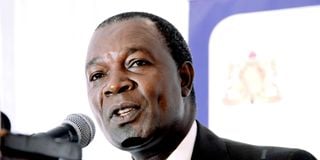Premium
Where the axe fell in President Ruto’s Sh300bn budget cuts

Treasury CS Njuguna Ndung’u.
The entire budget on foreign travel, training, purchases of furniture and motor vehicles has been cut, leaving the items the worst hit by President William Ruto’s Sh300 billion austerity plan on the expenditures of ministries, departments, and agencies (MDAs) in the current 2022/2023.
A schedule by Treasury Cabinet Secretary Njuguna Ndung’u showed that 100 percent of the remaining balances on foreign travel, training, and motor vehicle and furniture purchase budgets as of September 30, 2022, have been cut.
The Treasury has also effected a 75 percent cut on the remaining budgets on communication services, domestic travel, advertising and printing, hospitality, and vehicle rentals as of September 30, 2022.
A similar 75percent cut has been made on research and feasibility study budgets—underling the depth of the recurrent expenditure rationalisation programme that is targeted at freeing up cash for other more critical projects such as healthcare, education, and food security.
“Further, it has been decided that all MDAs will rationalise the development estimates by removing all new projects, rationalising projects with implementation challenges, reviewing counterpart funds and scaling down on externally funded projects with absorption between 60 to 65 percent,” Prof Ndung’u said.
Audit the salary requirements
The Treasury has additionally ordered the accounting officers of all MDAs to audit the salary requirements for their staff to curb abuse of funds through avoidable perks such as allowances.
“Accounting officers are required to review requirements for personnel emoluments and gratuity for the financial year and only reflect the actual requirements up to the end of June 2023. Any excess provisions should be surrendered for salaries” the CS said.
To ensure transparency, all MDAs are required to submit all payrolls for the previous and current financial year for the computation of the actual requirements. This would help gauge the value of non-essential expenditures such as travel, training, entertainment, and overtime allowances.
The cuts came barely two weeks after the National Treasury held budget restructuring meetings with all MDAs.
The various State departments under the big-spender Education ministry were the first to appear before the Treasury team.
The Salaries and Remuneration Commission (SRC) and the Auditor-General’s Office were the last to appear for the budget cut meetings with the Treasury on Friday, October 21, 2022.
The radical budget cuts are expected to impact the fortunes of several businesses including motor vehicle dealerships, furniture manufacturers and suppliers, media and advertising agencies, hotels and catering service providers as well as oil marketing firms.
Training consultancies
The hospitality industry, travel companies, and training consultancies are also expected to feel the pinch of the budget chops.
Expenditure on hospitality, travel, and training has been a key target by the Treasury amid abuse by some civil servants keen on unfairly topping up their take.
For example, fresh data from the National Treasury show that within the last three months of former President Uhuru Kenyatta’s reign to September, civil servants gobbled up Sh193.2 billion in expenditure on operations and maintenance votes.
This refers to spending on items such as domestic and foreign travel, hospitality, training, renting spaces for non-residential use, and maintenance of vehicles.
Spending on the items grew from Sh155.6 billion during a similar period- July to September- in 2021, underlining the burden added onto taxpayers’ shoulders within just three months, and as the country continued to face tough economic times marked by a high cost of living.
The report by Treasury showed that apart from growing by 24.2 percent compared to a similar quarter in 2021, the Sh193.2 billion spending on Operations and Maintenance also breached a target to spend Sh167.7 billion on the vote during the three months. This means civil servants overshot the spending- based on their target- by 15.2 percent.
Revenue collection performance
The government is currently hard-pressed for resources to finance its essential projects in the wake of harsh economic times that have impacted revenue collection performance.
A harsh economy has impacted key sectors meaning that the Kenya Revenue Authority has struggled to net sufficient collections. For example, tax man’s collections from consumption and income taxes missed the target by close to Sh14billion in the first quarter of the year.
It netted Sh459.5 billion from workers and company earnings as well as consumption levies, comprising excise duty, value-added tax (VAT), and import duty. This translates to Sh13.9 billion, short of the Sh473.2 billion tax target set by the Treasury for the three months through to September 2022.
Prof Ndung’u said accounting officers of the MDAs would give priority to clearance of pending bills and limit the award of new contracts.
“Accounting officers should ensure that pending bills and carryovers from the financial year 2021/22 are prioritised and paid for within the budgetary provision of the current year. Further, accounting officers should ensure that no contracts and tenders are awarded for goods and services without sufficient budgetary provisions” he said.





